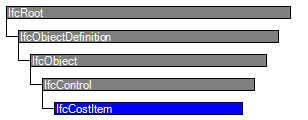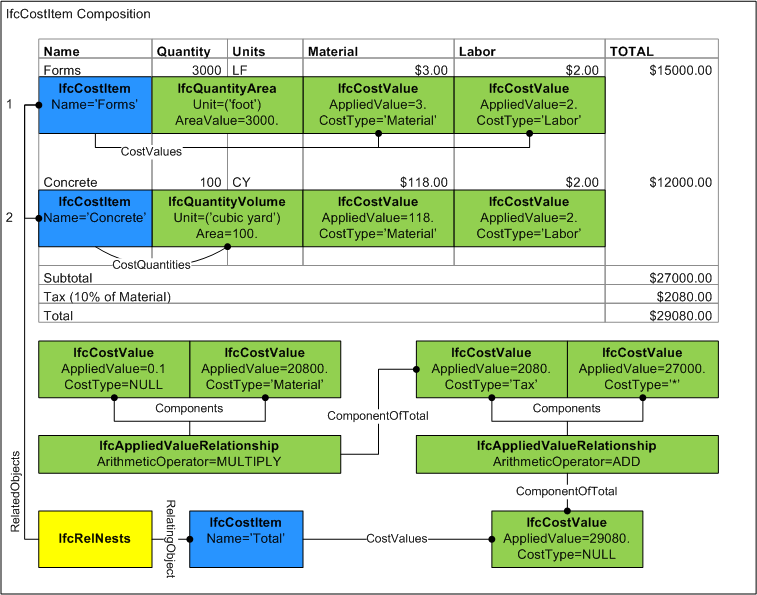Natural language names
 | Kostenelement |
 | Cost Item |
 | Item de coût |
 | Kostenelement |
 | Cost Item |
 | Item de coût |
| Item | SPF | XML | Change | Description | IFC2x3 to IFC4 |
|---|---|---|---|---|
| IfcCostItem | ||||
| OwnerHistory | MODIFIED | Instantiation changed to OPTIONAL. | ||
| Identification | ADDED | |||
| PredefinedType | ADDED | |||
| CostValues | ADDED | |||
| CostQuantities | ADDED |
An IfcCostItem describes a cost or financial value together with descriptive information that describes its context in a form that enables it to be used within a cost schedule. An IfcCostItem can be used to represent the cost of goods and services, the execution of works by a process, lifecycle cost and more.
Each instance of IfcCostItem may have a name and a description. Depending on the use for which the cost is intended, these values should be asserted on the basis of agreement. For instance, the Name attribute could be used to provide a common value that enables distinct instances to be brought together in a nesting arrangement (see below) while the Description attribute may be used to provide text used for item description in a costing schedule.
An IfcCostItem can link one or many IfcCostValue's representing a unit cost, total cost, or a unit cost with one or many quantities used to generate the total cost. The quantities can be given as individual quantities, or those quantities are provided as element quantities by one or many building elements. The IfcCostValue.CostType attribute indicates the category of cost, which may be used to present the value in a particular column. For nested cost items (having IfcRelNests relationship), IfcCostValue.CostType is significant such that IfcCostValue.AppliedValue is calculated as the sum of all nested costs having the same IfcCostValue.CostType or if set to an asterisk ('*'), then the sum of all nested costs of all cost types. An IfcCostValue may represent an original value or a value derived from formulas using IfcAppliedValueRelationship. For example, taxes may be calculated as a percentage of a subtotal.
HISTORY New entity in IFC2.0.
IFC4 CHANGE Attribute PredefinedType, CostValues, and CostQuantities added.
| # | Attribute | Type | Cardinality | Description | B |
|---|---|---|---|---|---|
| 7 | PredefinedType | IfcCostItemTypeEnum | [0:1] | Predefined generic type for a cost item that is specified in an enumeration. There may be a property set given specificly for the predefined types. | X |
| 8 | CostValues | - | This attribute is out of scope for this model view definition and shall not be set. | ||
| 9 | CostQuantities | - | This attribute is out of scope for this model view definition and shall not be set. |

| # | Attribute | Type | Cardinality | Description | B |
|---|---|---|---|---|---|
| IfcRoot | |||||
| 1 | GlobalId | IfcGloballyUniqueId | [1:1] | Assignment of a globally unique identifier within the entire software world. | X |
| 2 | OwnerHistory | IfcOwnerHistory | [0:1] |
Assignment of the information about the current ownership of that object, including owning actor, application, local identification and information captured about the recent changes of the object,
NOTE only the last modification in stored - either as addition, deletion or modification. | X |
| 3 | Name | IfcLabel | [0:1] | Optional name for use by the participating software systems or users. For some subtypes of IfcRoot the insertion of the Name attribute may be required. This would be enforced by a where rule. | X |
| 4 | Description | IfcText | [0:1] | Optional description, provided for exchanging informative comments. | X |
| IfcObjectDefinition | |||||
| HasAssignments | IfcRelAssigns @RelatedObjects | S[0:?] | Reference to the relationship objects, that assign (by an association relationship) other subtypes of IfcObject to this object instance. Examples are the association to products, processes, controls, resources or groups. | X | |
| Nests | IfcRelNests @RelatedObjects | S[0:1] | References to the decomposition relationship being a nesting. It determines that this object definition is a part within an ordered whole/part decomposition relationship. An object occurrence or type can only be part of a single decomposition (to allow hierarchical strutures only). | ||
| IsNestedBy | IfcRelNests @RelatingObject | S[0:?] | References to the decomposition relationship being a nesting. It determines that this object definition is the whole within an ordered whole/part decomposition relationship. An object or object type can be nested by several other objects (occurrences or types). | X | |
| HasContext | IfcRelDeclares @RelatedDefinitions | S[0:1] | References to the context providing context information such as project unit or representation context. It should only be asserted for the uppermost non-spatial object. | ||
| IsDecomposedBy | IfcRelAggregates @RelatingObject | S[0:?] | References to the decomposition relationship being an aggregation. It determines that this object definition is whole within an unordered whole/part decomposition relationship. An object definitions can be aggregated by several other objects (occurrences or parts). | X | |
| Decomposes | IfcRelAggregates @RelatedObjects | S[0:1] | References to the decomposition relationship being an aggregation. It determines that this object definition is a part within an unordered whole/part decomposition relationship. An object definitions can only be part of a single decomposition (to allow hierarchical strutures only). | X | |
| HasAssociations | IfcRelAssociates @RelatedObjects | S[0:?] | Reference to the relationship objects, that associates external references or other resource definitions to the object.. Examples are the association to library, documentation or classification. | X | |
| IfcObject | |||||
| 5 | ObjectType | - | This attribute is out of scope for this model view definition and shall not be set. | ||
| IsTypedBy | IfcRelDefinesByType @RelatedObjects | S[0:1] | Set of relationships to the object type that provides the type definitions for this object occurrence. The then associated IfcTypeObject, or its subtypes, contains the specific information (or type, or style), that is common to all instances of IfcObject, or its subtypes, referring to the same type. | X | |
| IsDefinedBy | IfcRelDefinesByProperties @RelatedObjects | S[0:?] | Set of relationships to property set definitions attached to this object. Those statically or dynamically defined properties contain alphanumeric information content that further defines the object. | X | |
| IfcControl | |||||
| 6 | Identification | - | This attribute is out of scope for this model view definition and shall not be set. | ||
| Controls | IfcRelAssignsToControl @RelatingControl | S[0:?] | Reference to the relationship that associates the control to the object(s) being controlled. | X | |
| IfcCostItem | |||||
| 7 | PredefinedType | IfcCostItemTypeEnum | [0:1] | Predefined generic type for a cost item that is specified in an enumeration. There may be a property set given specificly for the predefined types. | X |
| 8 | CostValues | - | This attribute is out of scope for this model view definition and shall not be set. | ||
| 9 | CostQuantities | - | This attribute is out of scope for this model view definition and shall not be set. | ||
Object Nesting
The Object Nesting concept applies to this entity as shown in Table 64.
| ||
Table 64 — IfcCostItem Object Nesting |
An IfcCostItem can nest other instances of IfcCostItem through its relationships to IfcRelNests. This can be used to enable the development of complex groups of costs as may be found in cost schedules through to pages, sections and complete cost schedules.
There is always a summary cost item as the root item of the tree representing the cost item nesting. Subsequent instances of IfcCostItem are assigned to the summary cost item using IfcRelNests. The summary cost item itself is assigned to IfcCostSchedule through the IfcRelAssignsToControl relationship.
Figure 202 illustrates a cost item composition used for a cost schedule. Each line item has a quantity and separate unit costs where IfcCostValue.CostType indicates the category of cost. The summary item has a hierarchy of costs calculated according to IfcAppliedValueRelationship.ArithmeticOperator, where IfcCostValue.CostType identifies the category to be totalled. The Tax component has IfcCostValue.CostType set to 'Material' which indicates it is the sum of all nested values of the 'Material' category ($3 x 3000 + $118 x 100 = $20800). The Subtotal component has IfcCostValue.CostType set to an asterisk ('*') which indicates it is the sum of all nested values of all categories.
 |
Figure 202 — Cost composition |
| Exchange | ||||
|---|---|---|---|---|
| Import | O | O | ||
| Export | O | O |
Control Assignment
The Control Assignment concept applies to this entity as shown in Table 65.
| ||||
Table 65 — IfcCostItem Control Assignment |
| Exchange | ||||
|---|---|---|---|---|
| Import | R | R | ||
| Export | R | R |
| # | Concept | Model View |
|---|---|---|
| IfcRoot | ||
| Software Identity | Bridge View | |
| User Identity | Bridge View | |
| Object Ownership | Bridge View | |
| IfcObject | ||
| Property Sets for Objects | Bridge View | |
| IfcCostItem | ||
| Object Nesting | Bridge View | |
| Control Assignment | Bridge View | |
<xs:element name="IfcCostItem" type="ifc:IfcCostItem" substitutionGroup="ifc:IfcControl" nillable="true"/>
<xs:complexType name="IfcCostItem">
<xs:complexContent>
<xs:extension base="ifc:IfcControl">
<xs:attribute name="PredefinedType" type="ifc:IfcCostItemTypeEnum" use="optional"/>
</xs:extension>
</xs:complexContent>
</xs:complexType>
ENTITY IfcCostItem
SUBTYPE OF (IfcControl);
PredefinedType : OPTIONAL IfcCostItemTypeEnum;
CostValues : OPTIONAL LIST [1:?] OF IfcStrippedOptional;
CostQuantities : OPTIONAL LIST [1:?] OF IfcStrippedOptional;
END_ENTITY;